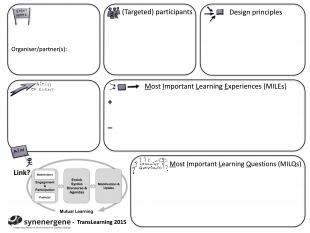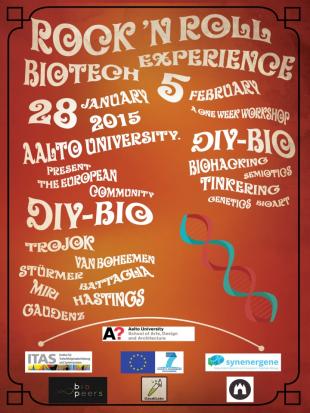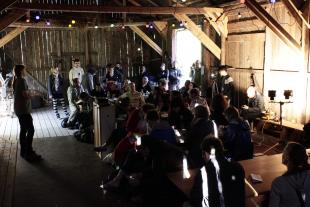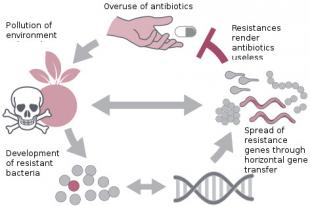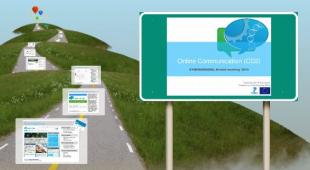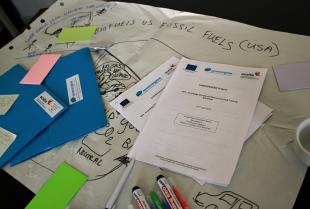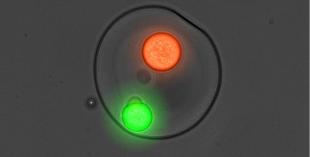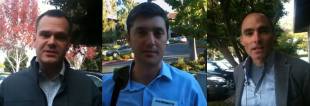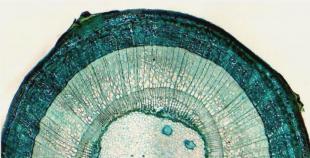With the completion of the SYNENERGENE project (2013-2017), a fascinating journey has come to an end for the more than 25 institutional partners who took part in it, and the many people and groups with whom we interacted.
read more and commentPerspectives
Enzymes "are at the center of synthetic biology" because of their ability to help make new products, said Frances Arnold, a biochemist, engineer and Dickinson professor at the California Institute of Technology.
read more and commentWe launched our Integrated Human Practices visual tool at the iGEM Giant Jamboree 2016. Read more here.
read more and commentIn the Trend Analysis Biotechnology 2016, three expert bodies recently advised the Dutch government to take a step back in attempting to regulate synthetic biology and other modern biotechnology.
read more and commentAt ESOF2016, Synenergene organised a reflection session on synthetic biology in collaboration with SYNBIOCHEM Manchester, titled “Synthetic biology and the new bio-industrial revolution” (
read more and commentRecently, the European Commission updated the model grant agreement for projects funded under the Horizon 2020 research programme, calling for respecting “the principles of honesty, reliability, objectivity, impartiality, open communication, duty
read more and commentAround 50 people attended the panel session on ‘freedom and security in an age of synthetic biology: challenges, concerns, needs’, chaired by Christopher Coenen, during the conference “Synthetic Biology – Visions of the Future” at NEMO, Amsterdam
read more and commentSome 40-45 participants in the conference “Synthetic Biology – Visions of the Future” at NEMO in Amsterdam on 24 June 2016 discussed cultural and religious aspects of synthetic biology with experts.
read more and commentA recent publication in Science proposing a multi million dollar effort to start writing the human genome was questioned in several comments. Among the autors are synthetic biologist Jef Boeke at New York University, genome scientist George Church at Harvard Medical School in Boston, Massachusetts, Andrew Hessel, a futurist at the commercial design studio Autodesk Research in San Rafael, California and quite a few other ‘members’ of the US synbio community.
read more and commentAre we insidiously running to the artificial creation of a human? George Church, with known recurring stunts - announcing the resurrection of the mammoth - published this June 2, 2016 an article (co-signed by 24 other US researchers) in Science announcing the mobilization to synthesize the 6 billion nucleotides of the human genome.
read more and commentJef Boeke, George Church, Andrew Hessel, Nancy Kelley and colleagues have raised quite some alarm over their ambitious proposal for a multi-billion Human Genome Project – write.
read more and commentAs a researcher exploring global decision-making and knowledge-making on synthetic biology, attending the meetings of the UN convention on Biodiversity offers a fascinating window on the multi-faceted international relations, tensions and
read more and commentIn this perspective I aim to elicit several preliminary lessons learned on ‘How to do RRI?’ from practice, which Synenergene partners have shared during the general assembly of Synenergene in Bristol, October 2015.
read more and commentIn January 2015 a team of 7 biohackers from 7 different countries united to give an amazing course to art and design students at Aalto University, Helsinki.
read more and commentThe mutual learning activities between iGEM and SYNENERGENE were continued this year, as we again called the iGEM teams to reflect on the societal ramifications of their projects by creating two types of scenarios.
read more and commentWithin the SYNENERGENE project, a number of online tools and activities have been developed and are yet going to be developed besides the main web presence on synenergene.eu.
read more and comment"Re-engineering life or Do we want to be unlimited" (RE-ENGINEERING LIFE oder WOLLEN WIR UNENDLICH SEIN?) is the title of a weekend-long theatre congress on the promises and perils of synthetic biology at SYNENERGENE partner
read more and commentThis year the Doomsday Clock was set at three minutes to midnight, two minutes closer to catastrophe than in 2014.
read more and commentA perspective published in the Biotechnology Journal points to tensions and possible pitfalls that may arise from basing the goals of synthetic biology to an excessive extent on notions of engineering and application, as well as from the
read more and commentThe year 2014 is almost over, we’d like to take a look back on synthetic biology and its role in society in the last 12 months.
read more and commentThe September 30, 2014 U.S. News & World Report article, “Virginia Researchers See Promise in 'Synthetic Biology,'” once again depicts the field of synthetic biology as simultaneously important for our future yet rife with misconceptions amongst the public...
read more and commentAn exciting workshop was held in Brussels on the 8-9th of April 2014. It was aimed at sharing knowledge and learning from each other on Synbio related topics.
read more and commentThe concept of responsible research and innovation ultimately depends on democratic principles, such as inclusiveness and pluralism, participative approaches or transparency in political decisions.
read more and commentWell, here we go. This is my first blog experience ever, and I am happy that it is about synthetic biology. After all, this in my view is the most exciting scientific/engineering endeavor that I have come across in the last 10 years.
read more and commentThe Synthetic Biology Project at the Woodrow Wilson International Center for Scholars focuses on all aspects of the emerging technology of synthetic biology, looking at its potential risks and benefits.
read more and comment"The alchemist’s rejected dream of creating a homunculus in a test tube has now been translated with the sober chemist’s dream of creating, not a little man, but at least a virus… perhaps eventually a bacterium. [...] What an audaciously stultifying proposal! One would hardly guess from this project that life already exists and has penetrated every nook and corner of this planet". These harsh words against the ambition of "creating life" were written by Lewis Mumford in 1970. Here, I use Mumford's arguments as starters to stir up debate on synthetic biology and discuss its ambitions.
read more and commentWhile the recently announced collaboration between MIT and Pfizer is old news in terms of the product the two will be working on (namely, biologics), the focus of the collaboration—a simpler drug manufacturing methodology that cuts down steps in the purification process— if successful, has the potential to cut costs and help in the long run to bring down prices of biologics.
read more and comment

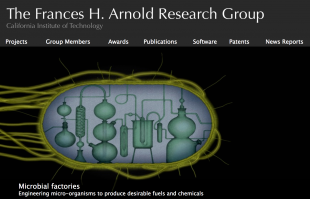
b702.jpg?itok=TevrWjcc)


